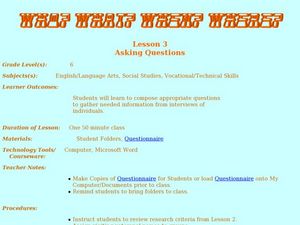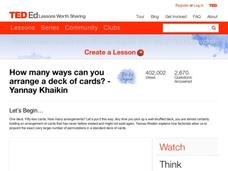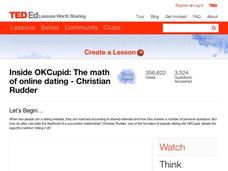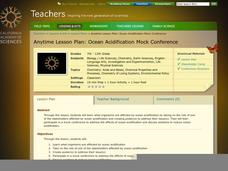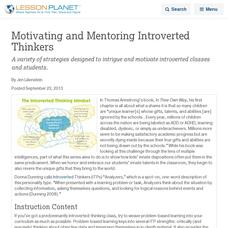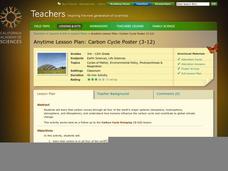Curated OER
Who? What? When? Where? Asking Questions
Sixth graders interview Veterans or role play to answer who, what, where, when questions. In this Veteran's Day questioning activity, 6th graders learn about the events in the military service of veterans. Students may simulate...
Teachers Network
A World of Symmetry: Math-Geometry
Define and identify the three basic forms of symmetry translation, rotation, and glides with your class. They cut out and arrange paper pattern blocks to illustrate symmetry, create a Cartesian graph, and design a rug with a symmetrical...
Curated OER
Blogging to Create a Community of Writers #1: Setting Up the Blog
Writer's workshop is an idea that's been around for years. Students write, read, and comment on each others writing in an authentic and thoughtful way. Here is a 21st century twist, 6th graders will use the class blog to create a...
TED-Ed
Sugar: Hiding in Plain Sight
Did you know that you can find added sugars in three-quarters of the foods you find in grocery stores? Invite your learners to consider how much sugar exists in the food products we eat on a day-to-day basis, as well as to learn about...
TED-Ed
The Fundamentals of Space-Time: Part 3
If you weren't already blown away by first two installments, check out this clip on how gravity and space-time interact! Our physicist friends, Pontzen and Whyntie, continue their discussion of these motion concepts for your high...
TED-Ed
How to Speak Monkey: The Language of Cotton-Top Tamarins
Tamarin monkey language can be categorized by stem upsweep, duration, peak frequency, and frequency change. Although other complex terminology is used to describe the 38 calls of this species, the video is easy to follow and a...
TED-Ed
A Digital Reimagining of Gettysburg
Why would Robert E. Lee order Pickett's Charge, an action that changed the course of the Civil War? Geographer and historian Anne Knowles uses digital technology to explain what she thinks is the missing piece in trying to understand...
TED-Ed
Tycho Brahe, the Scandalous Astronomer
Who says scientists are boring geeks? Certainly not the narrator of a short video who dishes up the scandals associated with Tycho Brahe, a Danish scientist and alchemist (now that's two labels you don't often see together) who used...
TED-Ed
The Colossal Consequences of Supervolcanoes
The threat posed by super volcanoes is explored in a short video that reviews the destruction caused by Mount Tambora in 1815 and by Peru's Huaynaputina in 1600. Think it can't happen again? The narrator contends that the explosive...
TED-Ed
How to Choose Your News
How do you get the truth unfiltered by middlemen? Tune into various sources and note the differences is the suggestion in a short video that begins by providing examples of how media gatekeepers have manipulated information and how those...
TED-Ed
From Aaliyah to Jay-Z: Captured Moments in Hip-hop History
To take "the definitive portrait of that person in that moment" is the quest of photographer and hip-hop historian Jonathan Mannion. In this short video, Mannion details his dedication to his art and the process he goes through to catch...
Curated OER
Alice in Fractalland
Take your class on a field trip to Fractalland where they'll learn all about number and shape patterns. Based on Disney's movie Alice in Wonderland, this resource takes young mathematicians on an adventure as they explore patterns in...
Special Olympics
Special Olympics Young Athletes Activity Guide
From bunny hops and bridges to bean bag tosses and big ball catches, your activity toolkit will be overflowing with great new ideas for adaptive physical education!
Center for Literacy and Disability Studies
Activities to Support Teaching the Alphabet
Whether or not your class includes kids with significant disabilities, teaching the alphabet to emergent readers and writers can be a challenge. Here's an activity packet designed for all learners.
TED-Ed
How Many Ways Can You Arrange a Deck of Cards?
Entertain and grab your learners' attention with a short video clip that engagingly teaches the concept of a permutation and how a factorial is a wonderful shortcut for theoretical probability calculations.
Curated OER
Inside OKCupid: The Math of Online Dating
Capture the hearts of your young statisticians with this real-life example of using statistics in online dating. The use of average and geometric mean are discussed in the context of creating the algorithm used to connect people.
Curated OER
Turning the Tide on Trash: Marine Debris Curriculum
Seven pages of fascinating reading on marine debris preface the activities in this lesson plan. Four different activities are employed to simulate how the debris is distributed in the ocean and along beaches. Early ecology learners...
Curated OER
The Risks of Everyday Living
Students compare their perceptions of risk to the perceptions of scientists and risk professionals. in small groups, they evaluate risks on a scale of 1 to 10 for the average American on a yearly basis.
Smithsonian Institution
The Soldier’s Experience—Vietnam versus World War I
The Vietnam War and World War I were two very important—and different—wars. To understand the differences, and similarities, class members watch videos, examine primary source documents, and then create a newscast that examines the...
Curated OER
Raise Awareness for National Learning Disabilities Month
Raise awareness of learning disabilities through reading, writing, research, and collaboration.
California Academy of Science
Ocean Acidification Mock Conference
In a comprehensive role playing activity, teens play the parts of different stakeholders in the realm of acidic oceans. They research, debate, and create a presentation from the perspective of either ocean organisms, the fishing...
Curated OER
Motivating and Mentoring Introverted Thinkers
A variety of strategies designed to intrigue and motivate introverted classes and students.
California Academy of Science
Carbon Cycle Poster
Humans can have a big impact on the environment, specifically the influence they have on the carbon cycle. First, the class will define and discuss each of the earths four major spheres, the biosphere, hydrosphere, atmosphere, and...
California Academy of Science
Kinesthetic Astronomy: Longer Days, Shorter Nights
A lamp, four globes, and some signs taped around the room are all you need to set up a solar system simulation for teaching how Earth's tilted axis creates the seasons. (Sticky dots are also needed, but not mentioned in the materials...
Other popular searches
- Disability Laws
- Disability Rights Movement
- Disability Access
- Learning Disability
- Intellectual Disability
- Physical Disability
- Social Security Disability
- Education and Disability
- Disability Discrimination Act
- Global Disability
- Disability Discrimination
- Disability Legislation
